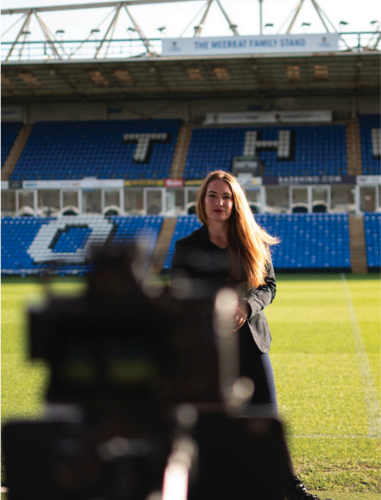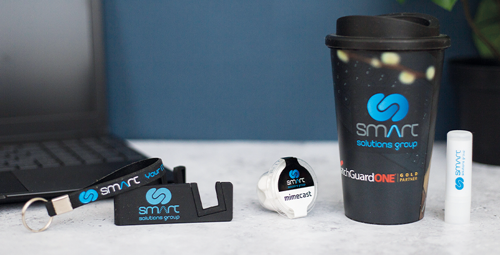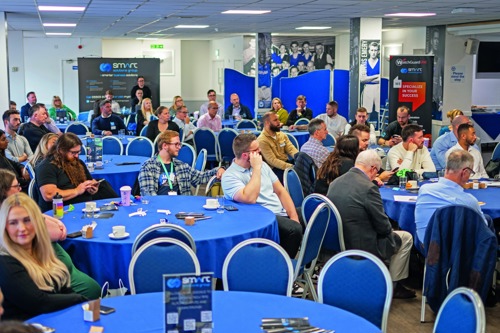 For most football managers, picking a team is about a combination that’s most likely to top the league. For Jenny Melling, sales and marketing manager at Smart Solutions Group, it broadly depends on who’s the most game for a laugh. Jem Collins meets Jenny Melling...
For most football managers, picking a team is about a combination that’s most likely to top the league. For Jenny Melling, sales and marketing manager at Smart Solutions Group, it broadly depends on who’s the most game for a laugh. Jem Collins meets Jenny Melling...
The Peterborough-based IT and telecoms provider has been working with The Posh - Peterborough United for the uninitiated - as a sponsor for the past three years. But, while big-name sponsorships can come with big exposure, for Melling it’s important to be strategic.
It starts by dividing opportunities into two buckets; brand exposure and company-relevant content. The key to success, says Melling, is getting a mixture of both. In some senses, brand exposure - where people see and remember your brand – is the easy part. “We’re on the stadium, we’re on the football shirts, we’re everywhere,” she explains.
But when it comes to related content, it’s about pushing the messaging further. For Melling, that means constantly asking the same question: “How do you link football with IT support?” Often this means getting creative; most recently, that’s come in the form of a video shot on the Smart Solutions Group helpdesk.
The plot? “I run out and say: ‘Guys, the stadium Wi-Fi’s gone down. They’re like: ‘Oh my god, we’ve got to get out and help.’ And then they go bumbling into the back of the van and we turf them out at the stadium.” The footballers might be the talent, but the brand’s messaging is at the core. 
This kind of content can only come from engaging with your partners authentically; Smart Solutions Group runs the IT support for the stadium itself, while Melling is a longtime season ticket holder; which also helps when picking her lineup. “You’ve got to get the right personalities. I knew which player we were getting and I thought: ‘This boy will do this’.”
Yet while the company is keen to push its technical expertise, this doesn’t always mean a high-tech approach; something Melling demonstrates by pulling out a wodge of leaflets stacked up behind her desk, ready to be sent to prospective clients. It’s an approach she likens to your bills at home.
“You’ll look and if you don’t want to open it - but know you need to deal with it - you won’t throw it in the bin. You’ll put it on the side and you’ll still see it. It’s the same if someone has to deal with security awareness training; they look at it and think: ‘I’ll look at that later.’”
The problem with emails, she argues, is that “as soon as it’s gone from someone’s inbox, it’s gone”. While a physical letter or merchandise may stay on someone’s desk indefinitely, an email will be buried, archived, or deleted almost instantly. After all, even the most conservative estimates say most office workers will receive upwards of 30 emails a day. Some put the figure closer to 120.
While tech can help with timing, Melling also says there’s an element of luck to email outreach; not only do you need to work out the right time for your outreach, but you also hope your message doesn’t become usurped by a competitor. So, after starting her role a little over two years ago, she switched the business from emailing proposals and quotes to hand-delivered notes. “I print them on a nice bit of card and I hand deliver or post them,” she explains. “They need it on the desk as a constant reminder.”
The move was also driven by a deeper understanding of the company’s audience. While it might sound counterintuitive for a tech firm, prospective customers probably aren’t the most tech-savvy. Typically, they won’t have their own inhouse tech teams but just know it’s a pain point they need to sort – so it’s about delivering a clear message in a medium that works for them.
Melling adds: “The person buying, they don’t want to read , because, like me, they don’t understand any of it. I don’t know anything about a server, I don’t know what it does, I just know apparently we need one.”
It’s a balance of making sure the brand has an easily understandable offering, while also showcasing a reassuring level of expertise. Often this comes from helpful tips and tricks within their social media posts, such as template scams to watch out for and explainers of why multi-factor authentication is like a “digital bouncer”.
 And, much like Melling’s offline approach to quotes, there’s a real life version too, complete with goodie bags and merch to stick around on your desk. The team’s cyber events are free to attend and focus on demonstrations, best practices, and networking.
And, much like Melling’s offline approach to quotes, there’s a real life version too, complete with goodie bags and merch to stick around on your desk. The team’s cyber events are free to attend and focus on demonstrations, best practices, and networking.
In the past two years, attendance has tripled and led to a steady stream of conversions over time.
“We’re not a hard sale type of business, we work very much on recommendation and reputation,” she concludes.
In other words, it’s all about the long game. Or at least longer than 90 minutes.
Back to ideas